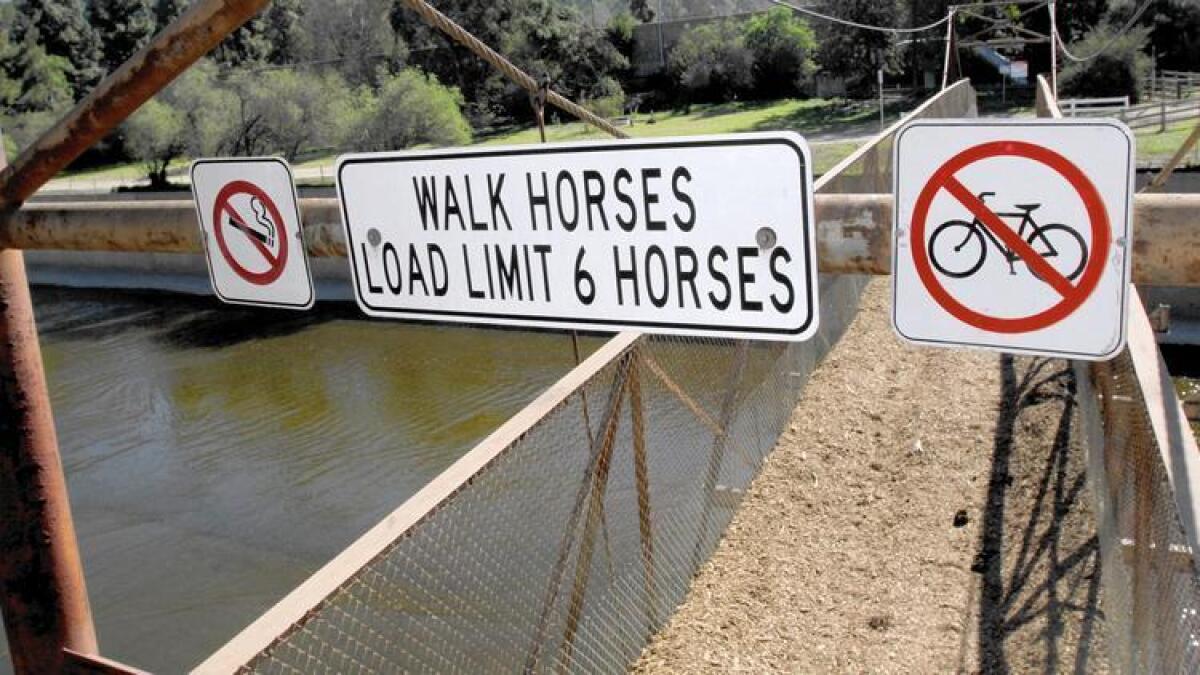Bikes banned from Mariposa Street bridge

Equestrians have been seeking to block bicycles from the Mariposa Bridge for months, arguing bikes and horses don’t mix.
- Share via
After hearing from close to 40 people calling for a total ban on bikes at the Mariposa Street bridge, several repeating testimony given two weeks ago, Burbank City Council members said this week they’ve got the message from the city’s equestrians in the Rancho and elsewhere.
“I get the bridge, I don’t need any more testimony,” said Councilman David Gordon. “I get it ... I hope we have no more meetings on the bridge.”
Vice Mayor Jess Talamantes thanked the speakers for sharing their points of view, adding, “we’ve been hearing them over and over again.”
Equestrians have been seeking to block bicycles from the bridge for months, arguing bikes and horses don’t mix. They spoke during a December council meeting supporting a proposed ordinance to ban bike riding on the bridge, but returned late last month to seek a new ordinance banning bikes altogether, which the council was set to approve this week without discussion.
One perspective that rallied a few more supporters this week, but not enough to sway the council, was a call for a compromise that would allow all members of the community to continue using the bridge afoot or on horseback — including those pushing or carrying bikes. The council unanimously banned bicycles from the span completely.
Some equestrians said they opposed the December ruling because they doubted unruly cyclists would comply.
The item is slated to go before the council again on Feb. 23 for a second reading, before it is adopted.
Origins of the bridge
Equestrians have argued the bridge has always been a horse bridge, and for bicyclists is a “bridge to nowhere” since bike riding is not permitted on the Los Angeles side.
Built in the late 1930s and dedicated in March 1939, it had the backing of cowboy celebrity Gene Autry at the time and was requested as “a suitable bridge for pedestrians and equestrians,” according to a city resolution from August 1938.
According to city records, Autry asked the Burbank City Council at that time to “lend every effort to see that the privileges of Griffith Park are not denied to the citizens of Burbank and those who patronize the local stables.” A petition signed by “several thousand” was also submitted in support of the resolution.
A Burbank Daily Review article in December 1938 said Burbankers and others had campaigned for the bridge, which would be for “only equestrians, cyclists and hikers,” after an earlier crossing was destroyed. They were concerned even then about automobile traffic on Riverside Drive, according to articles from the time.
“It will provide a motor-free thoroughfare from Burbank and Glendale into Griffith Park for hikers, bicyclists and riders,” a Burbank Daily Review article said in March 1939, days before the bridge opened.
Courtesy, compromise urged
Gerard Deegan, an athlete and a native of Ireland — “a horse-loving nation” — who moved to Burbank more than 20 years ago, said he was concerned that recent discussions about the bridge have pitted horse riders against bike riders, and had “become ‘us’ against ‘them.’”
“Common courtesy and decency applies to everybody,” Deegan said, arguing that horses and bikes will have to cross paths in the area when the Los Angeles River Bike Path eventually gets extended. “We need to work together.”
Nicholas De Wolff, who is a member of the Walk Bike Burbank steering committee but was not speaking officially on the group’s behalf, echoed a similar sentiment.
“Apparently I’m supposed to take one side or the other,” he said, but he stressed that Burbank is “one community” and urged officials to “try to find a shared solution that returns us to the collaborative, caring community” that attracted him to settle here.
Mary Dickson, speaking on behalf of Walk Bike Burbank, suggested rules giving equestrians priority to use the seven-foot-wide bridge but allowing pedestrians, including those with bikes, to cross when it’s not in use by horse riders.
The dominant viewpoint at the last several meetings, however, has been that allowing bicycles on the bridge at all puts horse riders and others at risk because of the ease with which horses are spooked. Bikes and horses don’t mix, they’ve said, and Lynn Brown, vice president of the Los Angeles Equine Advisory Committee said this week the reason is “speed.”
Horse riders are fearful bicyclists will spook their horses while they are in the middle of the bridge, suspended roughly 30 feet above the river. However, many of the examples they’ve cited of bikes frightening their horses involve cyclists riding on the horse trails in Griffith Park, where cycling is already banned.
Collaboration and what might seem like a “reasonable” compromise is not possible, equestrians said this week, largely because they believe bicyclists are arrogant scofflaws and “jerks.” They have argued a vandal spray painting over park signs that state “no bicycles” is evidence of this.
Councilwoman Emily Gabel-Luddy said one of the male proponents of sharing the bridge, though she wouldn’t say who, looked like someone who had made an obscene gesture when she tried to explain to him that bike riding is not allowed on the bridle trail recently. She would have supported a reasonable shared use concept, she said, were it not for that type of experience.
Councilman Will Rogers said in an interview Friday he suspects photos from a “hidden camera” near the bridge and calls for greater enforcement could bring a crackdown.
But cyclists may not be the only ones breaking the rules. It’s not clear who put them there, but unofficial “no bicycles” and “no smoking” signs are already hanging on the bridge, though city officials say they are not appropriate signs. Two equestrians this week also claimed they regularly cross the bridge into Griffith Park after dark, though the trails there close at sunset.
Patrick Dickson, policy and planning director for Walk Bike Burbank has photos of more than a dozen horse riders on the bridge at once, despite a posted limit of six.
The origin of the six-horse limit sign is not clear, according to Ken Johnson, assistant public works director for the city, but while the span can hold more than six horses, a study determined that was an appropriate limit “to manage the bridge use.”
It’s not clear how many cyclists actually use the bridge. Deegan, who has served as an assistant cross-country coach at John Burroughs High School since 2005, said he probably runs across the bridge two times a week and has never seen a bicyclist there. Rogers said he’s been to the bridge several times in the past few weeks and has never seen a cyclist.
Patrick Dickson said he’s only aware of two cyclists who regularly use the bridge. One of them, Burbank resident Doug Weiskopf, has been adamant in past meetings and letters to the editor about his right to do so, but he declined to attend this week’s council meeting to make his case.
“I’ve already addressed them twice previously on this issue and even if I could think of anything more to say I don’t believe they would listen and give me a fair hearing,” Weiskopf said in an email prior to the meeting.
--
Chad Garland, chad.garland@latimes.com
Twitter: @chadgarland
